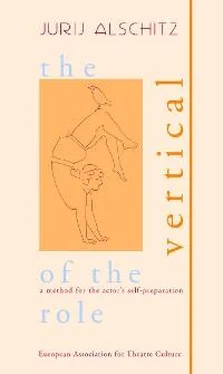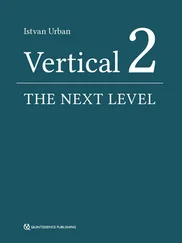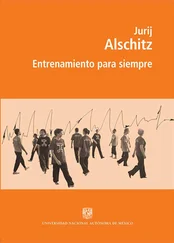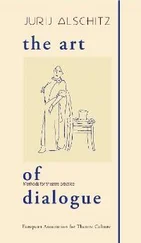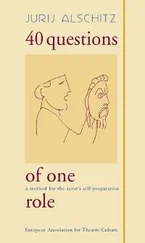
Jurij Alschitz
The Vertical of the Role
a method for the actor’s
self - preparation
translated by Natalia Isaeva
editing and the chapter on actors’ training
contributed by Christine Schmalor
translated by Hugh Rorrison
ars incognita
Berlin 2003
Part I The actor’s self - preparation
“It is pleasant, my friends, to sit and listen to you here,
but … to sit alone in a hotel room learning a role
… how much more exciting !”
Arkadina, The Seagull by A. Chekhov
1. Changing territory – leaving the theatre
Each and every profession has its own secrets – and there are enough of those secrets in actor’s work. My own mother was an actress and I often watched her on the sly while she was preparing her roles – wherever it might be – in a hotel room, on a garden bench, or in a train carriage. I always considered that process to be far more interesting than any of her real rehearsals in the theatre or even the theatre performances themselves. That is why, even now, it is with special awe and trepidation that I wait for that magical hour when intimate contact is finally established between an actor and the persona he is about to play, when one is about to witness the beginning of the role’s new life, when the actor enters into close artistic contact with his “personnage”. It is truly a magical, secretive moment. Normally, in artistic circles one prefers not to talk too much about it. It remains something exceedingly private. During that time the actor usually tries to stay alone. One assumes that no-one should bother him and that no-one can help. It is his secret. The secret belongs to him and to him alone, and no-one has any right to intrude here. This, however, is a myth – albeit a beautiful one.
Every profession has its own special secrets but also its own corpus of definite knowledge. Every kind of work is better left in the hands of a master. And whatever the cloud of mystery enveloping the actor’s profession, whatever the legends associated with it, ultimately it is only professional mastership that determines whether an actor really belongs there. It is this aspect that should ultimately interest those of us who professionally study theatre, especially its less known areas. One of those “mysterious“ areas of the actor’s profession is when the actor works on his role by himself.
My experience of working in theatre and teaching theatre has led me to a very simple conclusion: the actor only becomes the master and the real author of the role if he is able to work on it by himself, independently of any other mediation or intrusion. When he becomes a real author he assumes responsibility for the life of his work; no-one else is accountable for it. It is from this standpoint that I construct my relations when working with actors; it is this attitude that I regard as true and genuinely promising. Unfortunately, even today there are still unwritten laws on how to conduct rehearsals, demanding that the director depict in detail the outline of the actor’s role, the way it is constructed, and how it is to be lived through on the stage. From an artistic point of view this situation corrupts actors, destroys their creativity, and transforms the acting profession into a purely instrumental one.
Every actor and every director knows how often in theatre precious time is squandered unnecessarily. Some rehearsals boil down either to learning the text by heart or to some futile exchange of fleeting impressions brought about by the memories of someone’s personal life. At this kind of rehearsals an actor may arrive totally unprepared, totally empty, – and for the most part that is the state he leaves in after the rehearsal is over; and nobody is going to notice anyway. This passive squandering of time destroys creative energy and brings about sterility of thought. It is humiliating enough to be forced to attend rehearsals – but it is even more offending when only one of the partners working together actually prepares himself for the meeting while the other is content to arrive there empty and boring. In a situation like that I always have a feeling of smelling stale mothballs, I literally feel that I am getting older by the hour, being dragged down together with this dead theatre. I am really afraid of this kind of work and from time to time feel nothing but sincere revulsion for it. If, by way of contrast, both the actor and the theatre director bring along a whole inventory of ideas and suggestions, if they try to realise their dreams and fantasies, if they resolve their doubts together – then the rehearsal becomes an important event, a crucial point eagerly awaited and diligently prepared.
Recently in the theatre I have noticed an alarming development. The time allocated for rehearsals is gradually being reduced. One has to fight for every additional day: one has to explain that the limited rehearsal period also limits the creative search both by the actor and by the director, that it is forcing them to concentrate not on the process itself but on the result. Everybody agrees that this development cannot be good for the theatre but the situation only gets worse. Indeed, it has become fairly obvious that to withstand this pressure one has to change the very method and technology of one’s work on a role and on a theatre production as a whole. The winner will be the director who is first able to change the emphasis of his work with the actor.
To my mind, the matter of concern should be shifted towards the actor’s individual preparation. The actor’s “homework“ should take up the greater part of the whole period of preparation but at the same time it should be organised more methodologically, more saturated with special exercises. This guidance should become really professional, it should no longer be like looking for a black cat in a black room. Theatre rehearsals should take at most a third of the time given over to the preparation of the role and of the production itself. And their quality should not be judged by the amount of time spent; rather, everything should be defined by the content of these rehearsals. Let them be short and sporadic – the important thing is that they should be well prepared and fruitful. The actor’s independent preparation on a higher level will transform a rehearsal into a genuinely creative process, will make it an artistic event – of which all actors and theatre directors simply dream.
Most textbooks on acting I see try to avoid the problem of this work beyond theatre and, even if they do mention something of the kind, they usually repeat things propounded by Konstantin Stanislavsky a long time ago. Stanislavsky was actually the first theatre director who drew serious attention to the problem of the actor’s home preparation. He used to say: “The actor, more than any other artist, is in dire need of home preparation“1 Stanislavsky himself tried to shift the emphasis of the actor’s work, transferring most of it from the stage to the area of self-preparation: “The majority of actors are sure they are only supposed to work during rehearsals, while at home they can allow themselves to relax. However, it is directly the opposite that proves right. During rehearsals we try merely to clarify what has already been done at home. That is why I do not believe actors who chatter away during rehearsals instead of taking down and composing the plan for their homework.”2
Judging by this last phrase, Stanislavsky regarded theatre rehearsals by actors as to some extent simply a preparation for the main work to be done on their own. He felt it was necessary to get actors acquainted with minute and diligent work not only during rehearsals but also at home. Rehearsals on stage and rehearsals in a theatre school constitute a relatively small part of the actor’s preparation: “It is not enough to study … only during acting classes, where you get to know what should be done. You must prepare yourselves when you are on your own, you must correct the mistakes pointed out by the teacher.”3
Читать дальше
